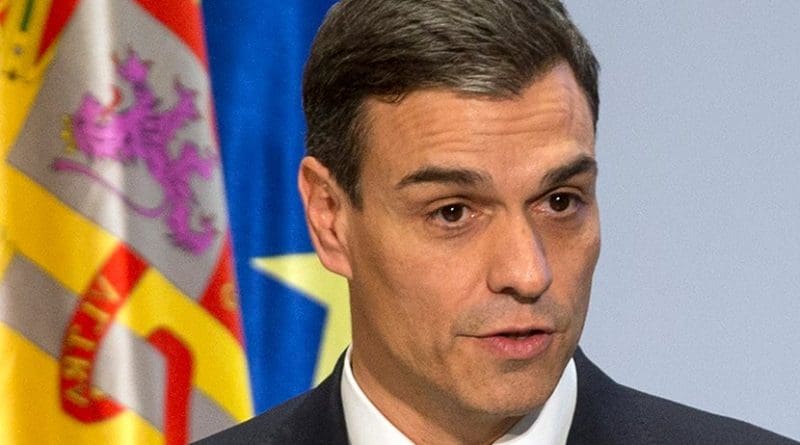Spanish Election Uncertainty Adds To Euro Zone Anxiety – OpEd
By Arab News
By Andrew Hammond*
Europe’s most important national election of the year will be held on Sunday, when Spain goes to the polls for the third time in the space of four years. With no single party expected to win nearly enough votes for an outright majority, either another period of minority government or a potentially shaky coalition will add to political uncertainty in the euro zone’s fourth-largest economy.
According to the latest polls, the ruling party of socialist Prime Minister Pedro Sanchez is likely to win the most seats. Yet, with around 30 percent of voter intentions, the Spanish Socialist Workers’ Party (PSOE) could fall approximately 50 seats short of the 176 needed for a majority.
Barring a continued period of minority government, this would open up the need for a coalition. Here, many voters favor a tie-up between the PSOE, the leftist Unidas Podemos alliance and nationalist Basque and/or Catalan parties.
Given the significant uncertainty over the election result, markets are worried about potential further uncertainty come Sunday. In part, this is because of mounting signs of political instability across Europe, plus stagnating growth in the large euro zone economies like Germany, France and Italy.
Sunday’s election comes after Sanchez was only sworn in as the nation’s prime minister last June. The political instability in Spain is mirrored in France, where President Emmanuel Macron remains under pressure from so-called “yellow vest” protests, which have now occurred 23 weekends in succession, and Germany, where Chancellor Angela Merkel’s long period in power is in its twilight.
Meanwhile, in Italy, Prime Minister Giuseppe Conte felt forced last weekend to say that his government will survive beyond May after speculation that clashes within the ruling populist coalition could prompt snap elections. This follows key disagreements, including between the two deputy prime ministers, Matteo Salvini from the far-right League party and Luigi Di Maio from the Five Star Movement.
Moreover, this political angst, alongside Brexit, appears to be contributing to flagging European economic growth. Last week, for instance, the IHS Markit composite purchasing managers index — a measure of activity in the manufacturing and services sectors — fell to a three-month low. And this after the counterpart IHS Markit measure for the manufacturing sector alone fell to its lowest level in six years on April 1.
While Germany narrowly skirted a technical recession at the end of last year, the Italian economy is in what may be a “perma-recession.” Conte said at the weekend that the government will soon approve a “growth decree” with a set of pro-growth measures.
It is in this context that the latest Spanish political uncertainty comes, with key concerns over the nation’s future governance. This is because the PSOE, which remains most likely to lead the next government, is nonetheless still widely blamed for the fact it was also in power about a decade ago, when the economy went into deep recession. At the last vote in 2016, the party suffered its worst national election showing since Spain transitioned to democracy following the 1975 death of dictator Francisco Franco.
This setback for PSOE comes in the context of an even bigger story in Spanish politics following the June 2016 election, which saw no party emerge with an overall majority. A dominant narrative of that ballot — the second in the space of six months — was the shattering of the long-running post-Franco political duopoly of the right-of-center People’s Party (PP) and PSOE.
Several “new” parties have helped fill the political vacuum. These include the far-right Vox, which could secure parliamentary seats for the first time, the leftist Podemos and Izquierda Unida (collectively known as Unidas Podemos, which is seen as the sister grouping of the ruling Syriza in Greece), and the centrist, business-friendly Ciudadanos. The rise of these groups has been fueled by popular anger over political scandals and the fallout from the worst recession for more than a generation, which saw a property crash and unemployment peaking at 27 percent.
While PSOE looks likely to emerge as the largest party on Sunday, depending on the exact election results, it is still possible that an anti-socialist alliance could emerge. This would probably be between PP, Ciudadanos and Vox, although it remains unclear if these three will collectively reach the threshold of 176 seats.
And, amidst the growing political clamor for independence in Catalonia, a key backdrop for Sunday’s election is the tension between Madrid and the separatists. On this issue, Sanchez is walking a political tightrope, given his potential need for support from Catalan parties post-election, but he has said that he will act with “strength and proportion” against any attempt by nationalists to repeat their 2017 separation bid.
Financial markets may become increasingly jittery if the election does not provide short-term, let alone medium-term, stability. If political risks were to rise significantly, this would have the potential to undermine the Spanish economic recovery.
Taken overall, Spanish governmental uncertainty is a microcosm of wider political angst within the euro zone, including in the other large economies of Italy, France and Germany. This instability across these euro zone nations may yet push the single currency area into a new slump, especially if the shock of a no-deal Brexit adds to the continent’s current woes in the coming months.
- Andrew Hammond is an Associate at LSE IDEAS at the London School of Economics.

